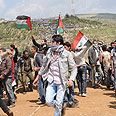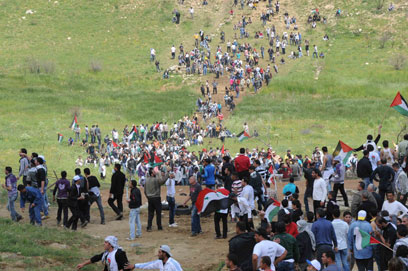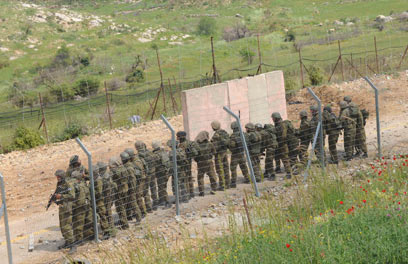

Deadly clashes on Israel's borders with Syria, Lebanon
Bloody Sunday: IDF forces fire at Syrian 'Nakba Day' protestors who breach border fence; four people reportedly killed, up to 20 hurt as dozens of infiltrators enter Israel. Meanwhile, 10 people killed, scores reportedly wounded in Lebanon border clash; IDF: They were hit by Lebanese army
Deadly border clash on 'Nakba Day': Four people were killed and dozens were hurt on Israel's northern border Sunday after Syrian infiltrators marking 'Nakba Day' trampled the border fence and were shot by IDF forces.
Magen David Adom emergency services said 13 people were lightly wounded on Israel's side of the border near the Druze village of Majdal Shams, including 10 IDF soldiers.
The wounded Israeli troops, who were hurt by stones hurled at them, include the Golan Brigade Commander, Colonel Eshkol Shukrun, who continued to supervise his forces despite his injury.
Dozens of ambulances rushed to the area, with village residents saying they could hear echoes of the fire for a long time. Security and emergency forces are operating cautiously at the site of the incident, where many landmines have been placed in the past.
The IDF said that the incident occurred at two sites in the area. Military officials said the IDF was using "all means" in order to keep infiltrators out of Israel. However, zones of Syrians were apparently able to enter Majdal Shams.

Masses gather at border (Photo: Avihu Shapira)
By Sunday afternoon, the infiltrators began to make their way back to Syria following negotiations between the IDF, police and Druze elders.
The forces tried not to intervene as the Syrian youngsters marched back to their country while calling out "we'll be back," encouraged by applause from the Druze villagers who looked on. By 5 pm Sunday, the IDF said that all infiltrators left Israeli territory.
'We come in peace'
"I'm tired of living in Syria, we'd rather die than see more bloodshed," one of the Syrian infiltrators into Majdal Shams told Ynet earlier. He called on Israel to grant him asylum, adding: "We've crossed the border in order to stay with our families, away from all the killing in Syria. We ask the powers at be in Israel to help us stay and not send us back."
Other infiltrators told Ynet that "we come in peace," adding that they had decided to cross the border in the aims of living in the Golan Heights – "even if it means risking our lives." Still, others declared "we are here to liberate the Syrian Palestinian land. These people are Palestinian freeman, Allah willing, the Palestinian groups will not give up."
Some of those expressing a wish to remain on the Israeli side of the border, said the uprising against Syrian President Assad is proving more and more dangerous and that many Palestinians now fear for their lives.

IDF troops on Syria border (Photo: Avihu Shapira)
Hundreds of police officers were dispatched to the region following the incident to maintain order at the site. Security forces are canvassing the area to ensure no Syrians remain in Israel, while Magen David Adom declared the highest level of alert.
Thousands rally on Lebanon border
Meanwhile, thousands of Lebanese citizens gathered at the Maroun al-Ras boardwalk near Moshav Avivim to protest on "Nakba Day." Lebanese Army forces pushed them away from the border by firing warning shots in the air.
According to later reports, Israeli forces also fired in the air to repel Palestinians demonstrating at the border, wounding dozens. At least 10 people were reportedly killed and more than 100 were hurt at the site.
IDF officials said the casualties were likely hit by Lebanese forces, who directed heavy fire at the protestors.
Security forces near the northern border have been on high alert throughout the day. IDF and police forces joined by Magen David Adom emergency services were deployed in the region early Sunday around. With the help of UNIFIL, IDF officials sent messages to the Lebanese army demanding that no Israeli infrastructure in the area be damaged, including the border fence.
IDF Northern Command Chief Gadi Eisenkot declared a northern road connecting various area communities as a restricted military zone.
Moshav Avivim Council Chairman Shimon Biton told Ynet: "For more than four decades now I've seen the Lebanese protest in Maroun al-Ras . They've never gotten close to the border fence. They're not going to do it today either. I suggest that Arab governments concentrate on taking care of their own people rather than thinkig of ways to hurt us."
Hanan Greenberg, Ahiya Raved and Reuters contributed to the report
- Follow Ynetnews on Facebook















